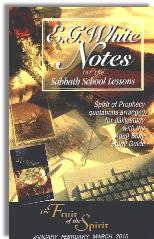|
||||||||||||||
Commentary on "The Fruit of the Spirit is Patience"
Day 1: Sabbath Afternoon, January 23, 2010
Overview
Read for This Week's Study: Gen. 6:3; Ex. 34:6; Mark 4:26-29; Rom. 15:5; Eph. 4:1,2; James 1:2-4
Memory Text: "For you have need of endurance [hupomone], so that after you have done the will of God, you may receive the promise." (Hebrews 10:36; NKJV)
Richard O'fill (editor of this quarterlies lessons) defines the two Greek words hupomone and makrothumia. These words are often translated in scripture; patience or endurance.
According to the author the issue of patience is how a person "behaves while waiting".
In conclusion, the author writes that by striving to "learn patience" a person is then placed in a position to receive blessings from God.
Observations
It is interesting that the nuances of the two words hupomone and makrothumia are emphasized differently between Richard O'fill and New Ungers Bible Dictionary. New Ungers Bible Dictionary emphasizes that hupomone refers to a "constancy of patiently waiting for" in respect to things. Makrothumia refers to forbearance with people. O'fill emphasizes a behavioral aspect of these two words rather than a submission to the God who develops this fruit through the Holy Spirit's literal presence in the body of a believer (Rom. 15:5).
Since Adventism does not believe in humanity having a "spirit"/immaterial part of an individual, the fruits of the spirit must be explained and experienced in a physical sense and defined as such. Patience becomes, as O'fill points out, how a person "behaves while waiting". A Christian worldview, on the other hand, which does believe in mankind having a "spirit" sees patience as a "sweet submission to the providential appointments of God and fortitude in the presence of the duties and conflicts of life."(a) Patience according to a Christian worldview is "internal" and has a very different meaning than an Adventist worldview of "behavior while waiting".
Proof texting is common in Adventism. Proof texting is when a theme is already predetermined, then a scriptural text is used out of context to portray the already predetermined theme. Yet, scripture is portrayed incorrectly when proof texting is used, because the scripture is taken out of context. O'fill uses this method subtly. To portray O'fill's theme of patience as behavioral rather than spiritual he writes, "A patient person is mild, gentle, and constant in all circumstances. The real test is not in the waiting but in how one behaves while waiting." Then O'fill quotes James 1:4, NKJV, "But let patience have its perfect work, that you may be perfect and complete, lacking nothing." The texts leading up to James 1:4 refers to the testing of a person's faith. Testing of a person's faith results in "internal" fruit rather than just "external" behavior. The NASB quotes James 1:4 more accurately according to the context of the text. "Consider it all joy my brethren, when you encounter various trials, knowing that the testing of your faith produces endurance. And let endurance have its perfect result, that you may be perfect and complete, lacking in nothing." (James 1:2-4; NASB) In the context of verse 4 James is referring to trials that produce confidence in divine truths and trust in God's promises and Sovereignty. James is referring to a deep abiding in the truth that God is Sovereign in the midst of trials. This is a fruit that is spiritual and comes from the Holy Spirit. This is quite a different worldview than being "mild, gentle, and confident in all circumstances." O'fill leaves out a crucial aspect that James is implying; i.e. faith/confidence in God.
By using James 1:4 and setting it amidst the Adventist theme of "patience as behavior" O'fill also emphasizes the Adventist belief that perfection can be attained before Christ comes. Again this is a very different worldview than mainstream Christianity who sees believers growing in holiness through the work of the Holy Spirit, but realizing perfection when Christ returns (1 Cor. 15:42-58).
Summary
- The Greek word translated for patience in scripture refers to waiting in respect for "things" or a forbearance with "people".
- Patience as a fruit of the Spirit refers to an internal confidence and trust in God in all circumstances.
- Holiness is developed in the Christian during their lifetime through the internal abiding of the Holy Spirit in the believer's life and perfection is realized at the second coming of Christ.
(a) pg. 966, The New Unger's Bible Dictionary, by Merrill F. Unger, 1988
GO TO DAY 2
Copyright 2010 BibleStudiesForAdventists.com. All rights reserved. Revised January 20, 2010. This website is published by Life Assurance Ministries, Glendale, Arizona, USA, the publisher of Proclamation! Magazine. Contact email: BibleStudiesForAdventists@gmail.com.
The Sabbath School Bible Study Guide and the corresponding E.G. White Notes are published by Pacific Press Publishing Association, which is owned and operated by the Seventh-day Adventist church. The current quarter's editions are pictured above.
Official Adventist Resources
Standard Edition Study Guide Week 5
Teacher's Edition Study Guide Week 5
Easy Reading Edition Study Guide Week 5
Search the Complete Published Ellen G. White Writings


